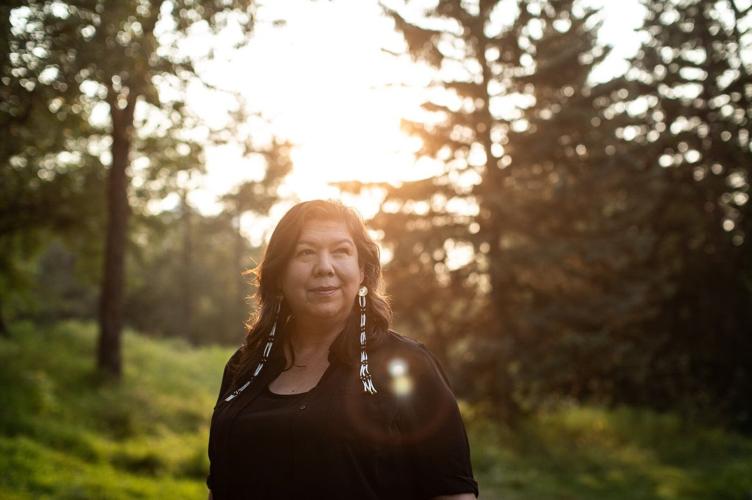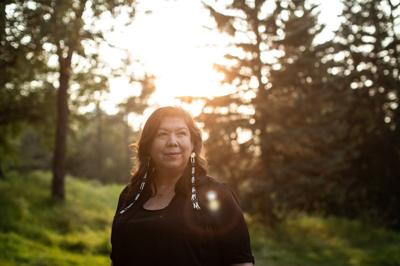TORONTO - Indigenous performers Michael Greyeyes and Michelle Thrush say the power of film is in bringing light to dark places, and thatÔÇÖs what they hope they can do with their ÔÇś60s Scoop drama, ÔÇťMeadowlarks.ÔÇŁ
Directed by Tasha Hubbard, the family saga about four scattered siblings brought together for one weekend makes its world premiere Sunday at the ╔ź╔ź└▓ International Film Festival, and screens again Monday.
ItÔÇÖs inspired by HubbardÔÇÖs 2017 documentary ÔÇťBirth of a Family,ÔÇŁ in which four Cree siblings who were taken from their mother as children gather for the first time as adults to piece together their family history.
Indigenous performers Michael Greyeyes and Michelle Thrush speak about portraying siblings separated from their family by the ÔÇś60s Scoop. The drama ÔÇťMeadowlarks,ÔÇŁ directed by Tasha Hubbard, makes its world premiere Sunday and screens again Monday at the ╔ź╔ź└▓ International Film Festival. (Sept. 7, 2025)
The Canadian PressReached before TIFF in Naples, Fla., Greyeyes said the government policy remains little-known and ÔÇťtragicallyÔÇŁ misunderstood today, more than a generation after 20,000 Indigenous Canadian children were put into foster care or placed for adoption with white families.
“There are various things that we talk about in our culture and people are familiar with them, like MMIW (missing and murdered Indigenous women and girls), things like intergenerational trauma ÔÇö this kind of stuff, people have an understanding of it. And when I go, ‘It’s about the ‘60s Scoop,’ even people who are pretty versed are like, ‘Hmm, what’s that?’,ÔÇŁ Greyeyes said in a joint video call with Thrush, who was in Calgary.
ÔÇťThis is not something that either Canada or the United States are proud of and they buried it. And part of our job as Indigenous artists is to make sure that the world knows our stories.”
Thrush agreed, describing the job of an artist as “we bring light to places that were previously dark.ÔÇŁ
ÔÇťWe often enter into territory that’s not always talked about or safe or in general conversation,” noted Thrush.
Thrush said much of the work involved conveying the inextricable bonds of siblings, but that it wasn’t hard to forge a connection with her co-stars, also including Carmen Moore and Alex Rice.
ÔÇťThe characters, as siblings, they lost so many years together. And I felt like working with these three actors and Tasha as our leader, that was our mission, was to fill in that beauty and that love and that light for so many of our community members who are finding their way home,ÔÇŁ said Thrush.
ÔÇťAnd how incredibly courageous that is for so many people in our communities.” ┬á
Reached in Edmonton, where she is an associate professor at the University of Alberta, Hubbard said Indigenous characters are too often treated as set dressing and their stories reduced to sad and tragic tropes. Indigenous creators are changing that, she said.
“We’re not just victims all the time, our characters in our films are complicated and beautiful and messy and struggling and overcoming. We have this range of humanity that’s been denied for a long time when it comes to film,ÔÇŁ said Hubbard.
ÔÇťI want to send a shoutout to (APTN/Crave series) ÔÇśLittle BirdÔÇÖ and that beautiful series that told the story from childhood to reconnection and the struggles around that.”
“I think this film is in conversation with that, (this time focused) around five people in their 50s, which is a special time of life.”┬á
ÔÇťMeadowlarksÔÇŁ is set to open in theatres in November. The ╔ź╔ź└▓ International Film Festival runs through Sept. 14.
This report by The Canadian Press was first published Sept. 7, 2025.

























To join the conversation set a first and last name in your user profile.
Sign in or register for free to join the Conversation